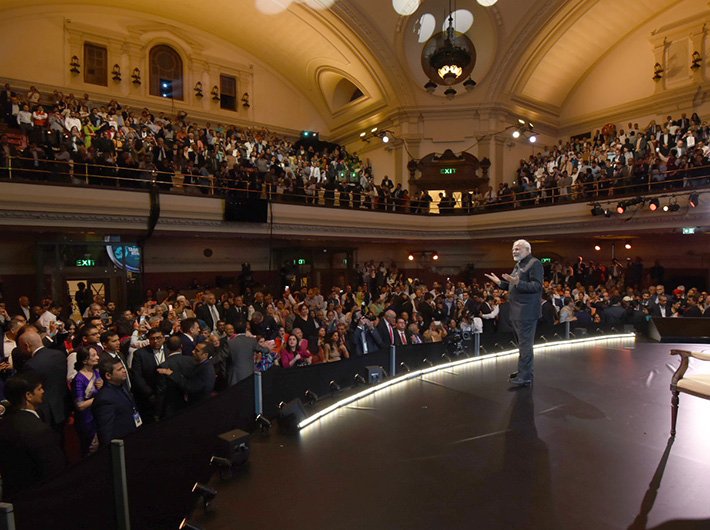It’s always lonely at the top. Prime minister Narendra Modi’s marathon townhall event at the Central Hall Westminster, titled ‘Bharat ki Baat, Sab ke Saath’, was nothing but his way of shedding that loneliness, communicating and mingling with people and showing his vulnerable side.
“I am one among you and I have all weaknesses that anyone has.” He repeated this sentence to emphasise that he is not infallible just because he holds the post of prime minister. Like any other human being, he has his own vulnerabilities. At the same time, he communicated in strongest terms that his mistakes would never be out of any mala fide intentions.
Rarely does a prime minister get an opportunity to bare his heart with a candour that allows him his own emotional space. And there is no doubt that the townhall at London was nothing short of a cathartic moment for Modi. And film lyricist Prasoon Joshi conducted it rather well with the finesse of a poet and inquisitiveness of a common man.
Take the manner in which Modi referred to incidents of crime against women, particularly rape, in his conversation. He was quite at pain over the tendency to look at these cases from the prism of politics. “Should we say that the number of rapes were less during the previous government and more in this government?” he said, adding that such a discourse would lead us nowhere.
Though Modi in his conversation lasting over two hours touched upon various issues ranging from his government’s achievements and internal security to foreign affairs, he cautiously held Gandhi’s Talisman – which says “Recall the face of the poorest and the weakest man whom you may have seen, and ask yourself, if the step you contemplate is going to be of any use to him” – as the guiding principle of his politics and governance.
Contrary to the perception of the Indian intelligentsia that those trained in the RSS ethos abhor Gandhian values and traditions, Modi’s liking for Gandhi is apparently guided more by political pragmatism than emotionalism. Right since his beginning as a political activist, he has genuinely believed that it would be difficult to grasp the nuances of Indian politics without understanding Gandhi. After becoming prime minister, in his series of programmes like the Swachchhata Abhiyan or cleanliness drive, he refers to Gandhi more often than the icons of the Sangh Parivar.
As for Gandhi’s famous ‘Talisman’, he was not quoting it for the first time; he has done so often before – for example, at a medical college convocation in 2015 and during his interaction with IAS probationers in 2017.
And there is a sound political reason which he explained in his conversation with Joshi. To a pointed query about how he has been able to take people along in his programmes, Modi explained that Gandhi’s uniqueness lay in his ability to connect his struggle with common people. He seemed to suggest that he had borrowed this political skill from Gandhi and tried to make people stakeholders in each of his initiatives. In his view, society’s innate strength is far greater than that of any government.
Perhaps Modi would not have lowered his guard if anyone else queried about his personal space. For instance, when Joshi asked him about his role as tea vendor in his early days, he said that it was something very personal to him. “That background has enriched me,” he pointed out. A shrewd politician that he is, he instantly connected with the poor and communicated to them that he is one among them and he regards his ascension to the PM’s chair as transient. To reaffirm his bond with the poor, he said, “I do not need to study poverty as I have lived in poverty”.
Having established his connect with the poor, Modi did not hesitate to display his muscular self when he referred to Pakistan and said that he would retaliate hard on those attacking India. “Eent ka jawab paththar se denge (We will retaliate with stones if bricks are hurled)”. Of course, on the issue of national interest, his love for Gandhi ceases and pragmatism takes over.
What was really unique in the whole exercise was Modi’s cautious effort to avoid to any critical reference to the opposition. Apparently, he was conscious of the tradition that Indian leaders tend to avoid uncharitable comments on the opposition when in foreign land. Apart from referring to political dynasties (an oblique reference to the Nehru-Gandhi family), he lauded the previous governments for their efforts but also mentioned that if a critical scrutiny of the four years so far of his term is undertaken, he would have a better track record than his predecessors. That the dialogue was shorn of high-table intellectualism was evident when he admitted that on economic issues like demonetisation, he could not converse in academic terminology like Lord Meghnad Desai (who was sitting in the audience) could, but he understood the society.
Of course, questions would be raised as to why the prime minister chose London as venue to communicate with people of India. The reason is quite evident. The controlled environment at the Central Hall Westminster proved to be an ideal venue for a freewheeling conversation with the prime minister. While Modi bared his heart and displayed his softer side, Joshi displayed enormous sensibility to draw out the maximum from Modi without appearing to be doing so – perhaps a lesson for Indian TV anchors.
[This comment has appeared on FirstPost.com]

